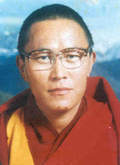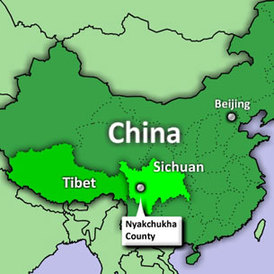 "I have always taught people that one should not harm any life, not even that of an ant. How could I then possibly be responsible for such an act?" Tenzin Delek Rinpoche
"I have always taught people that one should not harm any life, not even that of an ant. How could I then possibly be responsible for such an act?" Tenzin Delek Rinpoche
Last week, hundreds of Tibetans, young and old, began gathering in Kardze (Ch. Ganzi) prefecture in Sichuan Province to shout the name of a 59-year-old jailed monk, Tenzin Delek Rinpoche, according to sources who spoke with Radio Free Asia. Tenzin Delek has been labeled a "terrorist" by Chinese authorities, but to these people he is a hero.
Tenzin Delek was arrested in December 2002 for his alleged involvement in a series of bombings that caused one death and a number of injuries, and is currently serving a life sentence in Mianyang Prison. From the extensive research done on the case by Human Rights Watch, Tenzin Delek's arrest appears to have been a somewhat desperate measure in a series of efforts by local officials to curb the activities of a man who had become a threat to their authority. But although they have effectively silenced the man, they can't seem to silence his memory.
According to RFA's sources, this December 5th, about 60 Tibetans, mostly youths from Tenzin Delek's native village of Orthuk, went to Nyakchukha county government offices to appeal for his release. RFA reports that the protesters were attacked by security forces and their motorbikes smashed and dumped into army vehicles. But when word got out about the incident, people began to descend on Nyakchukha from neighboring counties to demonstrate on Tenzin Delek's behalf.
Days later, they are still coming. Many are older Tibetans "who want to see Tenzin Delek Rinpoche," a local Tibetan told RFA, on condition of anonymity. Some are avoiding roadblocks by walking over the hills. Some are refusing to leave, even when finding themselves blocked by large contingents of security forces who have warned the crowds of possible violent repercussions. The reports are sketchy (in many places in Kardze public phones have been removed to stop people from reporting events such as these) and some are still not confirmed, but they point to hundreds of detentions, injuries, hunger strikes, and towns under curfew.
So who is this man for whom Tibetans are willing to risk their lives and who Chinese authorities have called "one of the two greatest enemies of China"? (The other is, of course, the Dalai Lama.)
Over the decades leading up to his arrest, Tenzin Delek Rinpoche became hugely popular as a social activist and people's advocate. He established schools for orphans and the poor, free medical clinics and old-age homes. He openly expressed his loyalty to the Dalai Lama. And he was not afraid to challenge and criticize government cadres whom he believed to be self-serving, corrupt, or inefficient. The height of his success as an activist, and some say the beginning of his downfall, was a grassroots campaign to reclaim public forest land that the government had seized for logging. The locals won back their land, but officials never forgave Tenzin Delek for their loss of face.
Before then, it seems that they had tolerated him, perhaps appreciating the usefulness of his role as an intermediary between the local people and local government. But after the forest campaign, Tenzin Delek found life becoming increasingly difficult. His activities were labeled "political" and so were forbidden. His freedom of movement was restricted. He was occasionally detained and was twice forced into hiding.
Lochoe Drimey, one of Tenzin Delek's former students, organized a petition appealing his teacher's innocence in 2001. Lochoe, who fearing his own arrest later fled to India, collected 40,000 signatures and thumbprints. "It became a spontaneous mass movement and unanimous support for Rinpoche's safety," he told the Tibetan Centre for Human Rights and Democracy.
These days, in what must seem like a disturbing deja vu for government officials, Tibetans are once again out in numbers and insisting upon Tenzin Delek's innocence. Five of his family members reportedly traveled to Beijing a number of weeks ago to deliver a lengthy petition signed by 30,000 people, which called for a new hearing. The petition can be read in its entirety at High Peaks, Pure Earth.
"If you are out to condemn somebody, you can always find a charge," reads the petition. "If this case is not solved justly...all the people who follow him, regardless of whether the poor turn into beggars, whether men or women, they will definitely not stop appealing for justice."
According to Human Rights Watch, Tenzin Delek never received a fair trial. "The court was neither independent nor impartial, and the defendants were denied access to independent legal counsel....Claiming that state secrets were involved, Chinese authorities still refuse to release any of the evidence presented at trial." It also seems that China's promise to U.S. officials that the Supreme People's Court, the highest court in China, would carry out a "lengthy" review of the cases was not honored.
Tenzin Delek Rinpoche was probably sentenced largely on the basis of an alleged confession by his distant relative, Lobsang Dhondrup, who was accused of being an accomplice to the bombings. Lobsang's confession was never made public and it seems highly likely that it was extracted under torture. At his sentencing, Lobsang retracted his confession but was executed in January 2003.
Tenzin Delek, who also has repeatedly expressed his innocence, was given a suspended 2-year death sentence. A well-known Chinese human rights lawyer offered to defend him at his appeal hearing, but was informed that Tenzin Delek was happy with his choice of a local lawyer. His appeal was denied but his case sparked an international outcry. The governments of the United States, the United Kingdom,the European Union, India and others, pressured China on Tenzin Delek's behalf, and in 2005, his death sentence was commuted to life imprisonment.
Said Philippa Carrick of The Tibet Society UK, "With Tenzin Delek Rinpoche's health now seriously deteriorating, thousands of Tibetans, in genuine, heartfelt reaction, are rallying to his cause. They are asking for no more than a basic humanitarian gesture from the authorities that could lead to his release."
Tenzin Delek Rinpoche is reported to be suffering from heart pains and has difficultly walking. But even in his compromised physical condition, from the strength of these recent protests, it's clear that his reputation among Tibetans remains as vigorous as ever.
Rebecca Novick is the founding producer of The Tibet Connection radio program.

